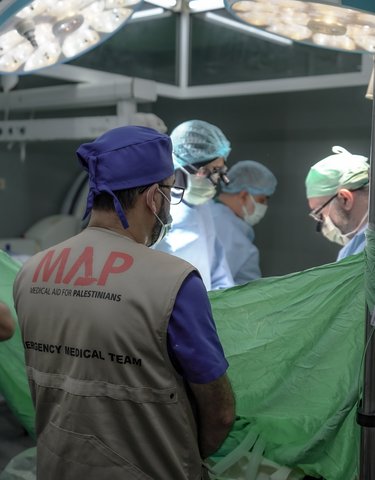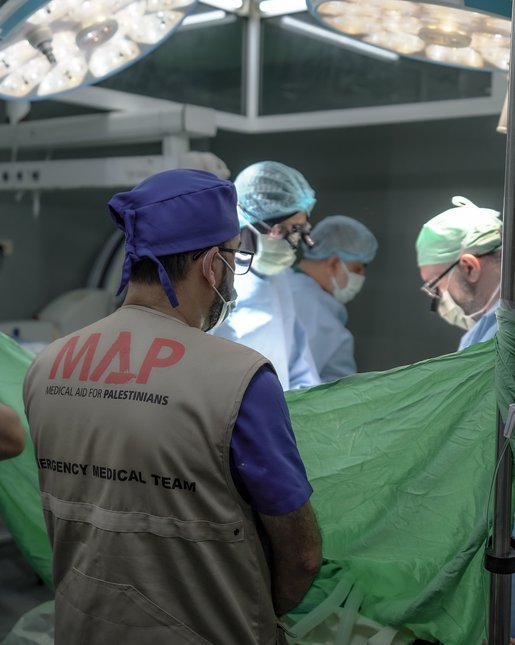What it’s like being a humanitarian aid worker in Gaza, more than 200 days into war
23 May 2024
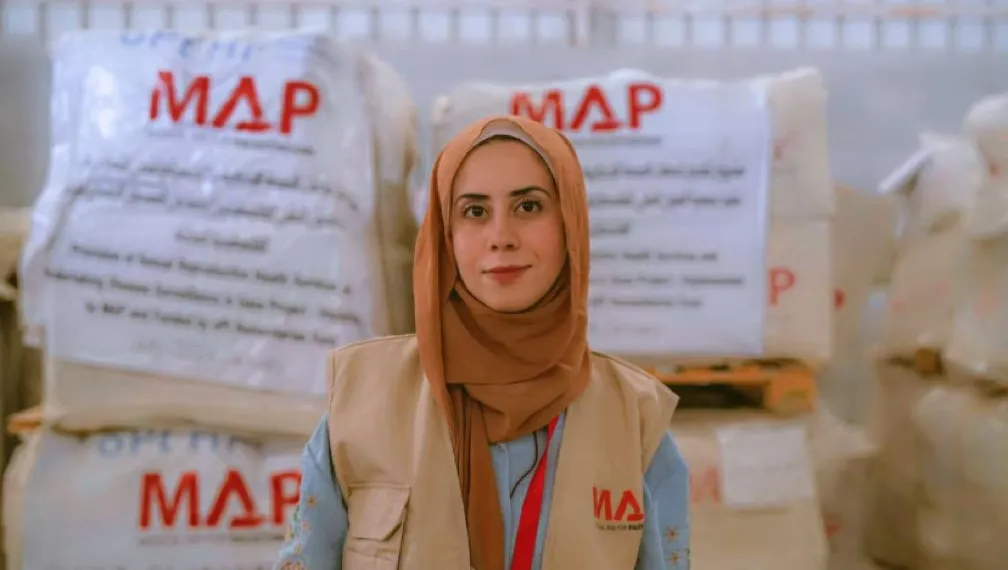
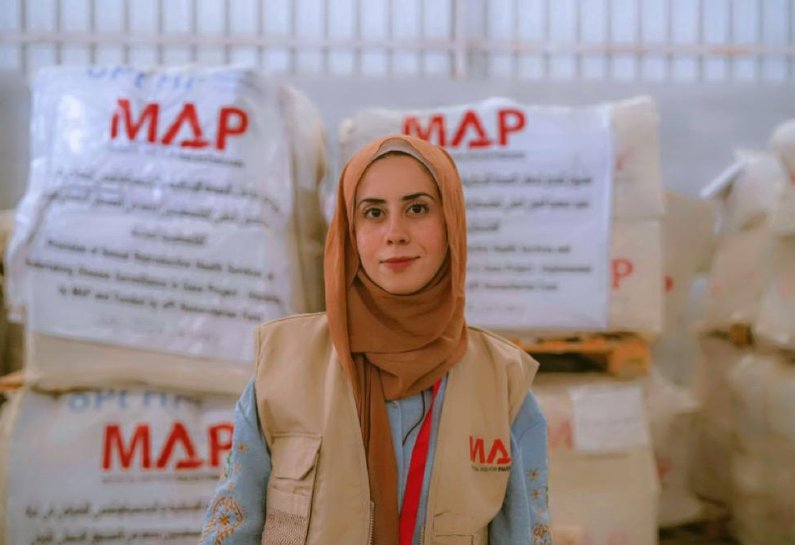
As aid workers, we’re not only dealing with the personal losses of this war but are facing difficulties in our work – from communication channels being disrupted, to a lack of vehicles, to difficulty in transporting and receiving supplies, to a lack of safety and protection. However, we are committed to carrying out Medical Aid for Palestinians (MAP)’s work and supporting Palestinian communities in this great time of need. Here is what it’s like being an aid worker in Gaza.
Working through war
Every work day, I wake up not knowing if I’ll make it back home. From navigating crowded roads to the constant threat of airstrikes and bombings. Gaza’s once bustling streets are now marked by destruction and despair. Rubble from bombed-out buildings litters the roadsides, tents and makeshift shelters dot the landscape for the displaced who have nowhere else to go. Everywhere you look, there are queues – queues for food, for water, for medical care – as people struggle to survive amid the chaos of this war. It is a scene of devastation and desperation, where every corner turned reveals yet another heartbreaking reminder of the toll of war on the people of Gaza.
As MAP aid workers, our days are spent delivering much-needed assistance to our communities. From distributing hygiene kits, clothes, mattresses, blankets, food, and medical supplies to providing shelter, medical points, and support to displaced families. Every task is met with its own set of challenges – shortages of essential supplies, impassable roads, and the constant threat of bombing are just a few of the obstacles that we must overcome to reach those in need.
As a Palestinian living in Gaza, I also grapple with the personal cost of this war, from having lost two beloved uncles, faced displacement, to having our house partially destroyed. Survival in Gaza is no easy feat, every day is a struggle to make ends meet, to ensure that our family have enough to eat and drink to sustain them through the hardships that lay ahead. Both my mental and physical health collapse very often these days, and I catch the flu or other illnesses from Gaza’s polluted air.
Balancing war, work, health, and personal life is a daily challenge. But perhaps the greatest challenge of all is bearing witness to the human cost of war. The faces of those who have lost everything haunt my dreams, their eyes filled with pain and desperation. The conditions in which people in Gaza live are far from normal. I see how our work makes a difference and helps restore their faith in what the next day will bring to their lives.
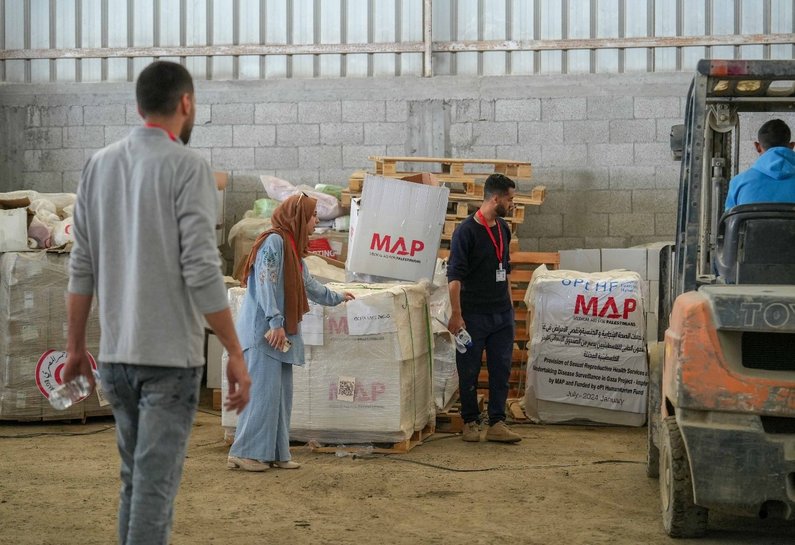
Family separation
Family separation is a harsh reality for many individuals living and working in Gaza, including myself and my colleagues. With family members displaced and scattered across different areas, visiting loved ones often becomes dangerous. The ongoing war and instability has made travel between areas challenging, if not impossible, leaving many of us separated from our families for extended periods.
Balancing war, work, health, and personal life is a daily challenge. But perhaps the greatest challenge of all is bearing witness to the human cost of war.
I personally haven’t seen my sister and nephews in months, and the distance feels particularly painful knowing that Gaza is relatively small geographically. In ‘normal times’, one could drive from the northernmost point to the southernmost point of Gaza in less than two hours. However, even short distances can feel insurmountable with the constant threat of bombings. I maintain connections with my sister through phone calls and messages. However, this is often easier said than done, especially when telecommunication services are disrupted.
I worry about my mother a lot. My beloved mother, 66 years old, requires two CT scans yearly for her upper thigh to monitor her condition, but she hasn't been able to receive any since October 2023. Unfortunately, even if the war in Gaza were to end, the necessary medical facilities and procedures would still be lacking. To make matters worse, there is no PET scan available in Gaza either. I worry about her health a lot, about the fact that her condition worsens as time passes.
In Gaza, where social networks and family support systems are crucial for survival, being separated from loved ones can exacerbate feelings of isolation and loneliness. No birthday parties for our grandchildren, no new year’s gathering, no Mother’s Day gathering, no Ramadan nights’ gathering, no happy Eid gathering, no end of school year party. We missed it all! One of my nephews turned three, he started walking, speaking, and is recognising faces. He doesn’t recognise me as his aunt though, he has only seen me once during this war.
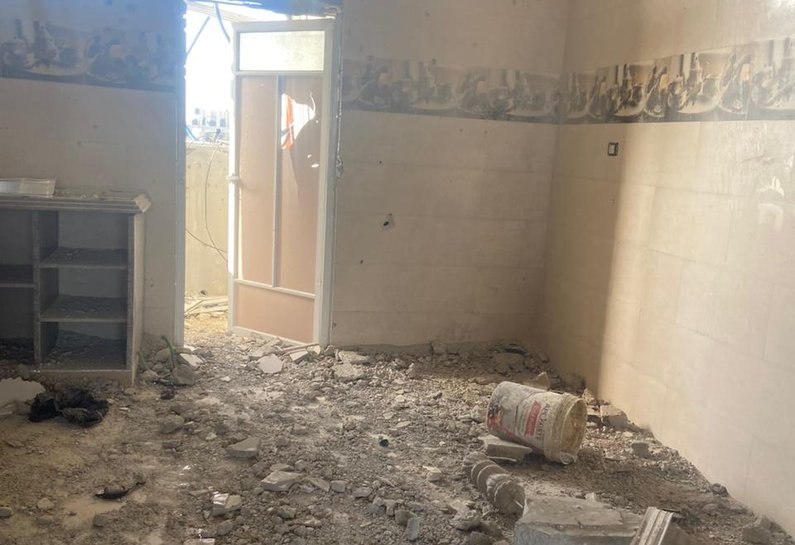
Massive humanitarian needs
My work at MAP takes me to Gaza's hospitals, where I witness firsthand the dire humanitarian needs facing the healthcare system. I have been to Al-Aqsa Hospital, Nasser Hospital and European Gaza hospital, where MAP has sent emergency medical teams (EMTs). Every time I step into one of these hospitals, I’m confronted with shortages of everything. From medical supplies and equipment to necessities like surgical bed sheets. Basic items like bandages, syringes, and surgical gloves are in short supply, forcing healthcare workers to make difficult decisions about how to allocate limited resources. In some cases, makeshift solutions are improvised, such as using plastic body bags in place of surgical bed sheets.
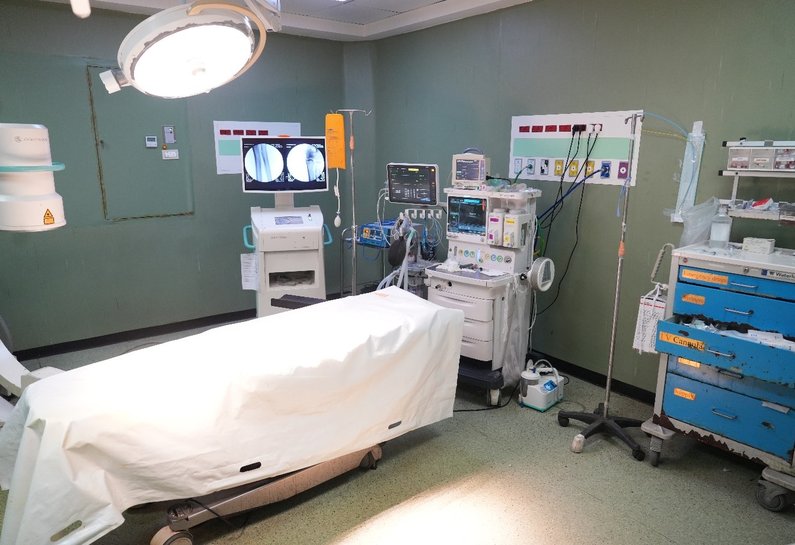
I also speak to local healthcare workers who are handling the most horrendous injuries a human can think of under the most horrific circumstances. Doctors, nurses and paramedics in Gaza are working 24/7 under the threat of being bombed, without being paid enough, and with little access to food, water or medical supplies. They’re superheroes who put the rest of the world to shame. MAP’s team work tirelessly to address these gaps, coordinating EMTs to support local health teams and delivering life-saving medical shipments from Egypt into Gaza to fill some of the shortages. Our collective efforts can make a profound difference in saving lives and alleviating suffering.
MAP’s team in Gaza were among the first to respond to the current emergency and remain one of the only international organisations working to provide humanitarian and medical services, including in the north. Please support our emergency response today.
This is the fifth of our ’Voices from Gaza’ blog series where we hear from members of MAP’s team in Gaza. Stay tuned for next week’s blog.
Photo: Tarneem at a MAP warehouse in Gaza.
